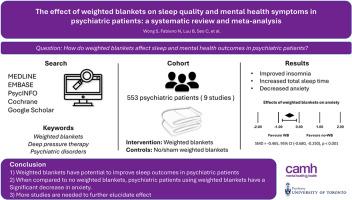The effect of weighted blankets on sleep quality and mental health symptoms in people with psychiatric disorders in inpatient and outpatient settings: A systematic review and meta-analysis
IF 3.7
2区 医学
Q1 PSYCHIATRY
引用次数: 0
Abstract
There is limited synthesized evidence for weighted blankets usage in psychiatric patients. We performed a PRISMA compliant systematic review and meta-analysis of the effects of weighted blankets on sleep and mental health outcomes in psychiatric patients. MEDLINE, EMBASE, Cochrane Library, and PsycINFO were searched up to December 15th, 2023. Randomized controlled trials (RCT) or cohort studies reporting objective outcome scales of sleep and mental health were included. Standardized mean difference (SMD) measured effect size. Q and I2 tests measured heterogeneity. Cochrane Risk of Bias Tool 2 and NIH Quality Assessment Tool assessed risk of bias. Nine studies of 553 psychiatric inpatients and outpatients with diagnoses including depression, bipolar disorder, ADHD, and autism. 289 participants received weighted blankets and 264 were in control groups. Intervention length ranged from 5 min to one year. Four studies reported evidence for weighted blankets in improving insomnia, total sleep time, and sleep onset latency. Six studies reported evidence for reducing anxiety symptoms. When compared to placebo, those using weighted blankets had improvements to anxiety symptoms (SMD = −0.47, 95% CI: −0.68 to −0.25, p < 0.001). One RCT had low risk of bias, 3 had some concerns, 1 was high risk. Three cohort studies were “fair” and one was “poor” in quality. It was found that weighted blankets can be effective in reducing anxiety in psychiatric patients. However, the literature is limited by heterogeneity of outcome reporting, lack of well designed RCTs, and small sample sizes. Highlighting the need for higher quality studies.

负重毯对住院和门诊精神障碍患者睡眠质量和精神健康症状的影响:系统回顾与荟萃分析。
有关精神病患者使用负重毯的综合证据非常有限。我们就加重毯对精神病患者睡眠和心理健康结果的影响进行了符合 PRISMA 标准的系统综述和荟萃分析。我们对 MEDLINE、EMBASE、Cochrane Library 和 PsycINFO 进行了检索,截止日期为 2023 年 12 月 15 日。纳入了报告睡眠和心理健康客观结果量表的随机对照试验(RCT)或队列研究。标准化平均差 (SMD) 衡量效应大小。Q和I2检验衡量异质性。Cochrane 偏倚风险工具 2 和 NIH 质量评估工具评估了偏倚风险。九项研究涉及 553 名精神病住院和门诊患者,诊断包括抑郁症、双相情感障碍、多动症和自闭症。289名参与者接受了加权毯治疗,264名参与者接受了对照组治疗。干预时间从 5 分钟到一年不等。四项研究报告显示,有证据表明加权毯可改善失眠、总睡眠时间和睡眠开始潜伏期。六项研究报告显示,加权毯可减轻焦虑症状。与安慰剂相比,使用加权毯的人焦虑症状有所改善(SMD = -0.47,95% CI:-0.68 至 -0.25,p
本文章由计算机程序翻译,如有差异,请以英文原文为准。
求助全文
约1分钟内获得全文
求助全文
来源期刊

Journal of psychiatric research
医学-精神病学
CiteScore
7.30
自引率
2.10%
发文量
622
审稿时长
130 days
期刊介绍:
Founded in 1961 to report on the latest work in psychiatry and cognate disciplines, the Journal of Psychiatric Research is dedicated to innovative and timely studies of four important areas of research:
(1) clinical studies of all disciplines relating to psychiatric illness, as well as normal human behaviour, including biochemical, physiological, genetic, environmental, social, psychological and epidemiological factors;
(2) basic studies pertaining to psychiatry in such fields as neuropsychopharmacology, neuroendocrinology, electrophysiology, genetics, experimental psychology and epidemiology;
(3) the growing application of clinical laboratory techniques in psychiatry, including imagery and spectroscopy of the brain, molecular biology and computer sciences;
 求助内容:
求助内容: 应助结果提醒方式:
应助结果提醒方式:


